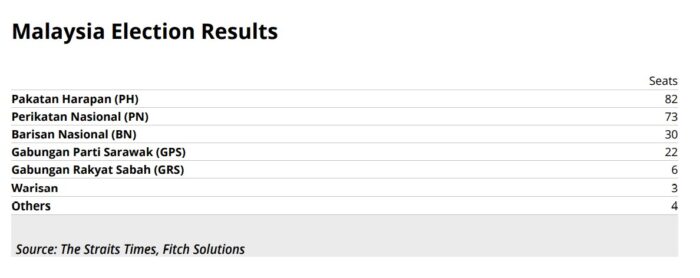GLOBAL research house Fitch Solutions Country Risk & Industry Research has reiterated its expectation for political stability to return in Malaysia once new government is formed, reinforced by the ‘anti-party hopping’ bill which was passed in July and came into effect on Oct 5.
“The law should prevent another collapse of the new government due to party defections,” Fitch Solutions which is independent of global credit rating agency Fitch Ratings pointed out.
“Theoretically, that should also lead to an improvement in the policymaking process, reducing the need for the next ruling government to seek support from smaller parties in order to prevent defections.
However, political analyst Dr Md Shukri Shuib has recently cautioned that the Constitution (Amendment) Act (No.3) 2022 does not prevent MPs from any party from giving support in their individual capacity to any coalition to form a new federal government post-15th General Election.
As its name suggests, Md Shukri said the anti-hopping law applies only to the MPs who hop to another party and those who quit their own party.
“An MP cannot quit his party. However, if he is sacked from the party, the anti-hopping law does not apply to him,” he told Bernama. “His sacking will affect his party. It is the party that will lose the seat. This is the tricky part.”

Following the current impasse which had led to a hung Parliament situation, Fitch Solutions said it will likely be raising Malaysia’s short-term political risk index score over the coming days “once the new government is formed, and when there is greater clarity with regard to policy direction.”
“However, if a new, stable government is not formed over the coming weeks, it could lead to greater uncertainty and weigh on our growth forecast of 5.8% in 4Q FY2022 and 4.0% in 2023 as investors take a wait and see approach.”
To re-cap, Malaysia’s tightly contested general election on Nov 19 has ended in a hung parliament.
The opposition Pakatan Harapan (PH) coalition led by Datuk Seri Anwar Ibrahim won the most seats (82) in the 222-seat Dewan Rakyat, followed by the Perikatan Nasional (PN) coalition led by ex-prime minister (PM) Tan Sri Muhyiddin Yassin (73 seats) and the ruling Barisan Nasional (BN) coalition (30 seats).
However, none of the three major parties won an outright majority, hence it is unclear (at the time of writing) if PH or PN will garner the support of at least 112 lawmakers necessary to establish a majority as negotiations between the various parties are still ongoing.
The Yang di-Pertuan Agong, Sultan Abdullah Ahmad Shah, has extended his deadline by 24 hours to today (Nov 22) at 2pm for lawmakers to inform him of their choice for PM. – Nov 22, 2022









